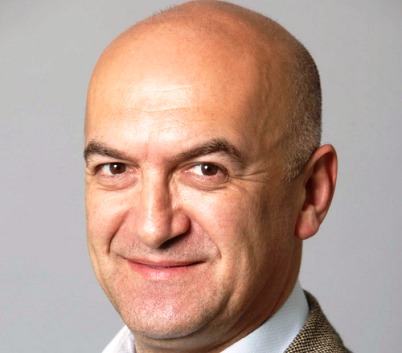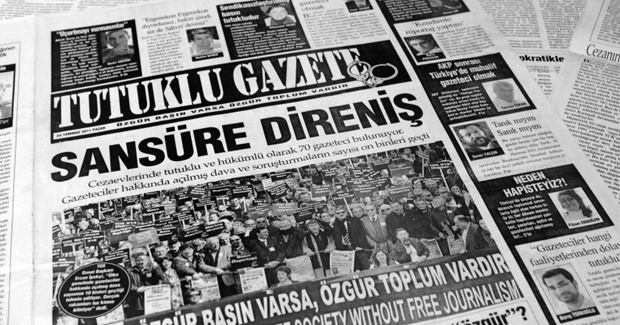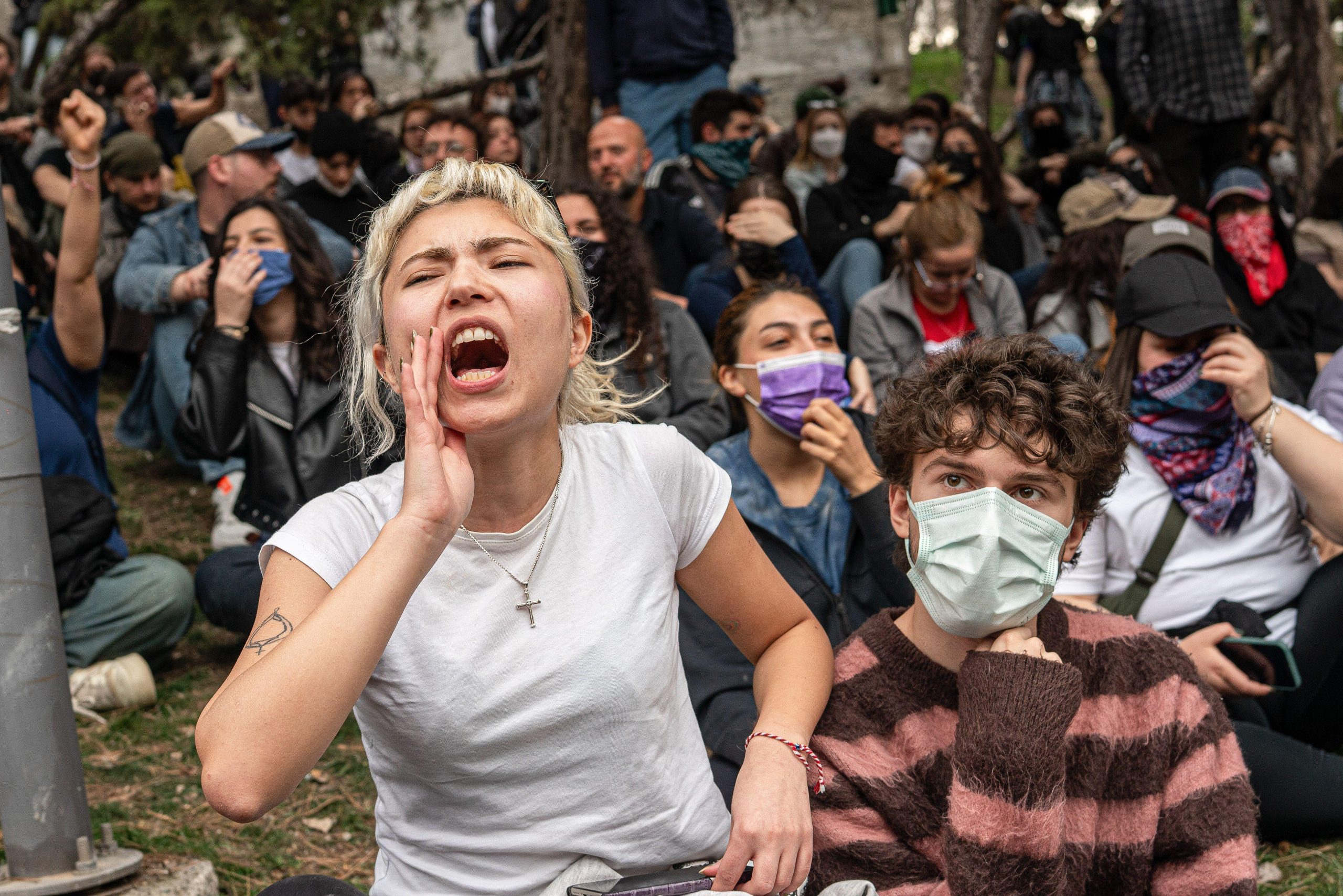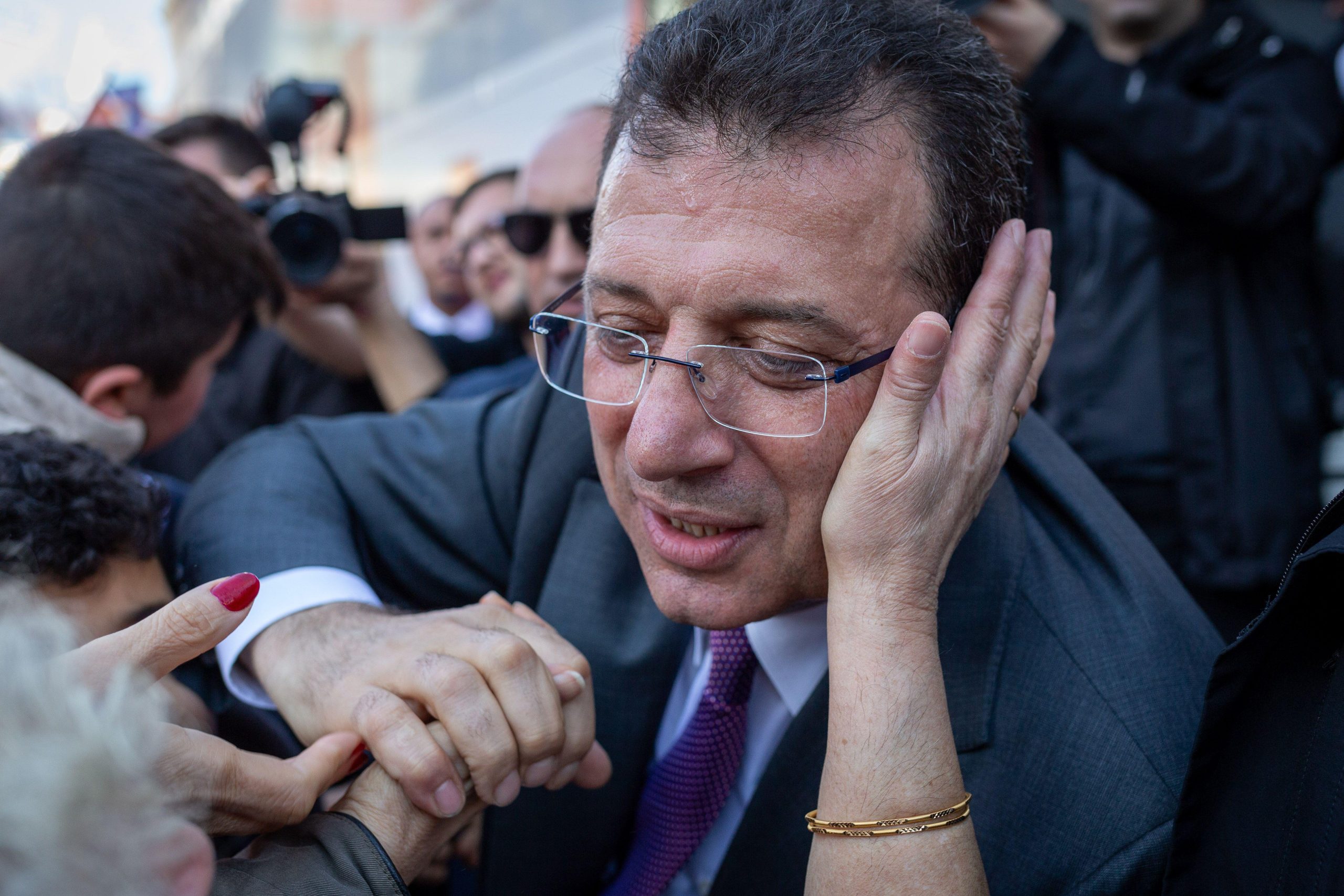
Journalist Yavuz Baydar has been fired by Turkish daily newspaper Sabah, after articles he wrote criticising the government were censored
In the latest report, Freedom in the World 2013, Freedom House defines Turkey as ‘partly free’.
Authorities in Ankara – both the government and bureaucrats – refute these claims, although the Ministry of Justice openly admits that there are serious shortcomings when it comes to providing for freedom of expression, both in law and implementation.
Some international organisations, such as the Organization for Security and Co-operation in Europe (OSCE) and the European Federation of Journalists (EFJ), meanwhile, help build the myth that Turkey tops the world rankings for one of the worst ‘oppressive’ states because of the number of jailed journalists there. The Committee to Protect Journalists reports that there are 49 journalists in prison, while Reporters Sans Frontières put the number at 72, if the number of people includes all jailed media professionals. But claims that the country is entirely free or grossly oppressive are both wrong. These extreme views must be taken with a pinch of salt; the truth is somewhere in between.
The complexities of Turkey today make it a unique case, demanding careful examination so that clichés can be dispersed, particularly those deriving from the perception that the country remains a police state, as it was prior to the late 1990s.
Turkey today is exactly as Freedom House says it is: not ‘free’, nor ‘not free’, but ‘partly free’.
In this context, Turkey’s problems are already out in the open.
Thousands of Kurdish activists connected to the Koma Civakên Kurdistan network – affiliated with the Kurdistan Workers’ Party (PKK) – as well as around 200 students and 72 other journalists and activists (mainly Kurdish) are in detention.
According to the monitoring site engelliweb.com, internet access is blocked to approximately 9000 websites, mostly on an arbitrary, non-transparent basis.
Prime Minister Recep Tayyip Erdog˘an regularly files libel charges against journalists and cartoonists, a move that singles him out because other powerful figures do not engage in similar practices. He has developed a habit of lashing out at the media in public, which has had dire consequences.
The so-called ‘mainstream media’, in other words, the 85 per cent of it controlled by proprietors who are for the most part engaged in vast business activities other than media (and therefore dependent on the government for economic interests), is suffocated and distinctly lacking in freedom and editorial independence.
In big media outlets, fierce censorship and self-censorship are practised on a daily basis.
They are severely crippled in their pursuit of journalism, unable or unwilling to cover corruption and abuse of power or to allow critical voices and dissent to be heard. When it comes to particular topics, such as criticism of the government, corruption or abuse of power, news stories are either filtered or unpublished; direct censorship – the actual blacking out of text – is exercised when material is found to be ‘too sensitive’ for the government’s or newspaper owners’ interests. But at the same time, there is little problem with pluralism and diversity, as opposed to countries like Iran, China, Azerbaijan or Belarus. With more than 40 national dailies (including a few independent newspapers and a vital partisan, antigovernment press), 2500 local papers, 250 private TV channels (of which 18 broadcast news seven days a week, 24 hours a day), 1300 radio stations and more than 150 news websites and online portals, Turkey has a big, competitive sector. Internet access is increasing at a huge rate, with access passing the 50 per cent mark recently. Because of the internet, despite attempts to command control, this is a milieu in which no story or comment is missed.
Anti-terror law and Ergenekon
The state of Turkey’s media freedom has been oversimplified, looking only at the number of journalists incarcerated without distinction, without looking closely at the specifics for those detentions. It’s a remnant of Cold War mentality. ‘Turkey is an undemocratic country’ has become almost like a slogan, concealing far deeper problems that extend throughout many sectors and structures within Turkish society.
This article is from the current edition of Index on Censorship Magazine. | Subscribe
It is true that people are in jail for voicing dissent, among them journalists. Almost all of them are Kurds who, because of the very nature of the Kurdish cause they pursue, combine publishing and self-expression with activism. This means their activity falls inside the boundaries of the utterly problematic Anti-Terror Law, which makes it extremely difficult to distinguish between those who
are members of terrorist groups that commit acts of violence or praise acts of terrorism and those who are simply exercising their right to express opinion. Dissidents, including journalists, have faced detention and prosecution because the law makes it practically impossible to make these important distinctions. The Anti-Terror Law must, at the very least, be revised so that it conforms to the European Convention on Human Rights (ECHR) or, better still, abolished altogether.
Around 10 per cent or so of those jailed are Turkish journalists whose imprisonment relates to the Ergenekon case – a clandestine, undemocratic, politically motivated mafiastyle network that, among other acts over a number of years, plotted a series of coups to oust the government and parliament. Since 2008, dozens of journalists have been arrested in connection with Ergenekon plots, together with hundreds of military officers.
Yet, in these cases, the most obvious clash with ECHR directives has to do with the extremely lengthy detention periods and trial procedure (take, for example, the case of Özkan vs Turkey). Needless to say, Turkey should have determined these periods of incarceration in line with international standards, including EU human rights legislation, releasing journalists while they awaited their trials. But apart from these cases, the European Court of Human Rights has rejected many appeals lodged by the accused, undercutting the assumption held by many that journalists should enjoy immunity even when charged with serious crimes such as conspiracy.
In addition to anti-terror laws, there are dozens of articles – in the Penal Code, in Turkey’s Internet Law, the Press Law and Turkish Radio and Television Law – that restrict freedom of expression and freedom
of the press. Some are implemented on a regular basis and some remain dormant, though still on the books. These punitive measures threaten freedom in Turkey, applying not only to media but also to academia, NGOs, political parties and ordinary citizens across the country.
The rise of independent media and the threat to public interest
Paradoxically, Turkish ‘glasnost’ under the ruling Justice and Development Party (AKP) over the past decade, with the immense help of the EU accession process, has meant, for the most part, that there are no longer many taboo subjects. National mass hypnosis is over. Tiny but independent news outlets – like the dailies Taraf and Zaman or the weekly Nokta – have helped broaden debate about the country’s murky past, untangle myths about the army being the guardian of the system and expose crimes against humanity.
In a pluralist and hugely diverse environment such as Turkey’s, it would be a lie to claim that news dissemination has been fully blocked. Take the case of the Uludere bombing in 2011, when a group of Kurdish villagers were attacked by Turkish fighter jets as they travelled from Iraq along a well-known smugglers’ route, resulting in 34 deaths. Main media group outlets failed to report on the killings for almost a day, but minor papers and those using social media began reporting on the incident
within minutes of it happening.
It could be argued that Turkey has one of the most independent medias in the world – it is truly a phenomenon.
Many countries in democratic transition after the end of the Cold War have had complex changes in their media environment, particularly in southeastern Europe, the Black Sea region and the North Caucasus. From the late 1980s on, this environment has been marked by the emergence of a new type of media proprietor who often – as in some Balkan countries as well as in Russia – entered the media sector with other businesses in tow, with mafia-like habits and connections, with the aim of money laundering, or with enormous greed. For the most part, these players aimed to use media outlets as a tool for keeping government and bureaucracy in check because they became fearful of what might be reported in this new, thriving media landscape, but these people and companies only had personal business gains in mind. Turkey has been part of this reality, and those coming to it from wellestablished, high-standard media environments in the West either do not understand or do not consider the considerable threats to media freedom to be important.
In some countries, for example, Albania, Serbia and Ukraine, media conglomerate proprietors operate in alliance with the ruling powers, establishing politics-media cooperation in the service of their mutual interests, rather than allowing media to serve the public interests.
This addictive system is the primary source of censorship and self-censorship in the wider region, and the blame for destroying the prospects of good journalism must be shared equally between politicians and media owners. In Turkey, in most cases, proper coverage of corruption and any investigative journalism are completely dead. Because this proprietor prototype is in essence non-transparent, Turkey’s media has never bothered to or been in a position to demand transparency or accountability from those in control of the news. In this context, nowhere in the world is the self-destructive role of media proprietors more visible, more irrational or more aggressive than in Turkey
On 19 October 2011, Prime Minister Erdog˘an assembled media proprietors in Ankara to ask for ‘help’ regarding ‘terror coverage’. It’s a call the media should have rejected, but instead they went beyond even what the prime minister had desired: they openly begged him to tell them exactly how long he thought TV dispatches on funerals connected with terrorism should be and shamelessly offered to set up a ‘censorship committee’ by themselves! If created, it would be tasked with ‘filtering’ news prior to publication, particularly when it pertained to clashes between the military and the PKK and political statements issued by them and other Kurdish activists.
In a more recent case, on 18 March 2013, there were reports that the proprietor of the daily newspaper Milliyet, Erdog˘an Demirören, forced veteran pundit Hasan Cemal to resign after he wrote a column defending the right to publish accurate stories, no matter how ‘disturbing’ they would be for the government or media owners. The article was never published, a breach of the journalist’s contract with his employer. Accused of causing the departure of Cemal, Prime Minister Erdog˘an, in his blunt manner some days later, explained that the very same proprietor had visited him to ask whom he should appoint as editor-in-chief for the newspaper.
The uphill struggle: how to solve Turkey’s media dilemmas?
These episodes speak volumes about how polluted Turkey’s media corporate culture is today. Media professionals – by which I mean real, decent journalists, and not those who either defend the government no matter what, or those who condemn it outright under the false belief that all journalism must be oppositional and not critical – face two rather hopeless challenges.
The first frontline for journalists is the political executive and the legislature. Unless the current government amends all laws in favour of freedom of expression and the press, these problems will keep reappearing. In general, the current parliament is a forum of intolerance for freedom of the press, opinion and dissent. In the mindset of the current parliament, the ‘old Turkey’ still rules.
Secondly, media proprietors represent a real challenge to free speech: most of them have no clue about the role and nature of good journalism.
I have long argued that unless these media owners are challenged, one cannot simply go on blaming everything on the political powers. But how do we challenge media owners? Because this is the key to enhancing freedom and independence in Turkey.
It is an uphill struggle. Journalists in Turkey have been forced to live under the ‘unholy alliance’ between governments and big media owners. It is a vicious cycle and very tough to break. We must persuade owners not to interfere in editorial decisions and let us be; we must encourage them to ct transparently in their businesses. Currently, none of them has the civil courage or the wisdom to be on the side of journalists’ fight for freedom.
We could try to persuade the government to ban media owners from entering public tenders, restrict cross-ownership, support local media and allow high share investments for foreign capital owners, with the aim of giving much more autonomy to the national broadcaster, Turkish Radio and Television.
And, of course, we can pressure the government to ensure union activities and memberships in all media outlets are protected by law.
Although their cases are of course the most urgent, problems regarding media freedom in Turkey will not cease to exist when all the journalists in jail – detained or sentenced – are released and pardoned. Turkey can never be part of the democratic league as long as it insists on suppressing and punishing dissent and free speech. But if we limit our professional struggle to these cases only, and introduce minimal amendments to some of the worst laws, we will continue to affect only the tip of the iceberg. If we do only this, held back by a sector that is bleeding spiritually, ruled by owners who are insensitive to the profession, operating without independence, we will continue to operate in appalling conditions, where newsrooms resemble open air prisons.
Freedom must be coupled with true professional independence.
©Yavuz Baydar
Yavuz Baydar is a columnist for Today’s Zaman and was, until he published a piece criticising media ownership in The New York Times, the news ombudsman for the daily newspaper SABAH
This article is from the current edition of Index on Censorship Magazine. | Subscribe






